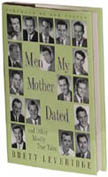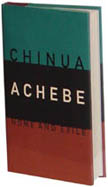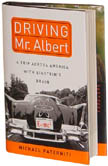|
Simply looking at the cover of this book lets readers know they are in for a treat, and Brett Leveridge delivers. Leveridge spends the first half of the book telling readers about various men his mother dated, detailing such dates as her first fraternity formal (and therefore her first fight and her first night in jail), her rendezvous with Jack Kerouac, and the day she had five dates in one day to win a bet for six months' free breakfast. The variety of men his mother allegedly dated and the crazy situations in which she found herself make for fits of laughter and plenty of skepticism. But Leveridge's mother takes up only half the book. He uses the last half to extrapolate on the world as he sees it, to share his own observations on life. His wide range of musings again leave one gasping for breath. Leveridge has reservations about the shady cast of characters in the Gold Bond Medicated Powder commercials "...if you're chafing, please, keep it to yourself...", he says. Another major worry in today's society seems to be the proper course of action when one finds himself, shall we say, overly excited, during a massage: "What is to be done if this uncomfortable situation does happen to, er, arise? Should one apologize? Excuse oneself and hurriedly return to the locker room for a cold shower? Pretend it's not there? Talk a little baseball?" Leveridge turns his mother's dating life and his own views of the world into quite an enjoyable read. Let's hope this webmagazine writer will take to writing books for awhile.-Christina Dwiggins
In Home and Exile by Chinua Achebe, the Nigerian novelist, poet, and critic examines the impact of European colonialism in both African literature and his own life. With events from his childhood in Nigeria and as a university student in London, Achebe describes his progressive disenchantment with the imperialist perspective that the African writer is an unfinished European, and that somehow outsiders can know Africa better than native writers. Ultimately, Achebe thinks lingering racist attitudes can be altered with literature produced by native Africans. As a post-colonial theorist, Achebe critically analyzes the history, culture, and literature concerning the former colonies of Europe's imperial powers. In Home and Exile, like his post-colonial essays, Achebe identifies three central issues. First, he rejects the master-narrative of western imperialism and encourages the subordinated African natives to write their own stories in a world where history has previously been written by Europeans. For example, Things Fall Apart, Achebe's masterpiece and Africa's best-selling novel ever, is a story by an African about an African man's life in his native village. Second, Achebe writes to subvert Eurocentric literary values, and he strives to expand the canon to include post-colonial writers. Finally, because European discourse has constructed the natives as inferior, the natives must resist imitating this European discourse in their own literature. Achebe insists that African culture is as legitimate as any culture, and the Africans' stories can be the true source of power in the world.-Clint Stivers
With such a wacky premise - two men driving across the country with Albert Einstein's brain ultimately to visit Einstein's granddaughter - this book threatens to become just another road tale with a weird twist, but Michael Paterniti made sure that it is about much more. To flesh out the events of the road trip, he did some exhaustive research and reporting that enabled him to write full chapters detailing some of Einstein's most eccentric history as well as his most faithful fans. And Paterniti himself has plenty of reflections about life and love to offer throughout. In the first two chapters, this book grows to encompass subjects such as marriage, friendship, fame, and America's obsession with immortality. Though Einstein casts his shadow over every word of the book, Paterniti's companion, Dr. Thomas Harvey, is the real star. The pathologist who performed Einstein's autopsy did himself a favor by taking the man's brain home with him and has made a career out of being the safekeeper of the brain. Through Paterniti, we get a first-hand glimpse of Harvey's weird relationship with the brain and where it has taken him in life. The book, though, ends up being a well-written memoir, full of Paterniti's doubts and questions about Einstein, Harvey, and himself. Instead of finding freedom like he had through earlier road trips across the country, he learns that he wants to be with his girlfriend in Maine and that Harvey, though eccentric and interesting, is no substitute for his home life. Driving Mr. Albert is utterly unique in what it accomplishes. Blending reportage and memoir, research and travel writing, Paterniti has taken creative nonfiction to the next level.-Steven Tweddell
|
||
|
|
 MEN MY MOTHER DATED AND OTHER MOSTLY TRUE TALES
MEN MY MOTHER DATED AND OTHER MOSTLY TRUE TALES HOME AND EXILE
HOME AND EXILE  DRIVING MR. ALBERT: A TRIP ACROSS AMERICA WITH EINSTEIN'S BRAIN
DRIVING MR. ALBERT: A TRIP ACROSS AMERICA WITH EINSTEIN'S BRAIN